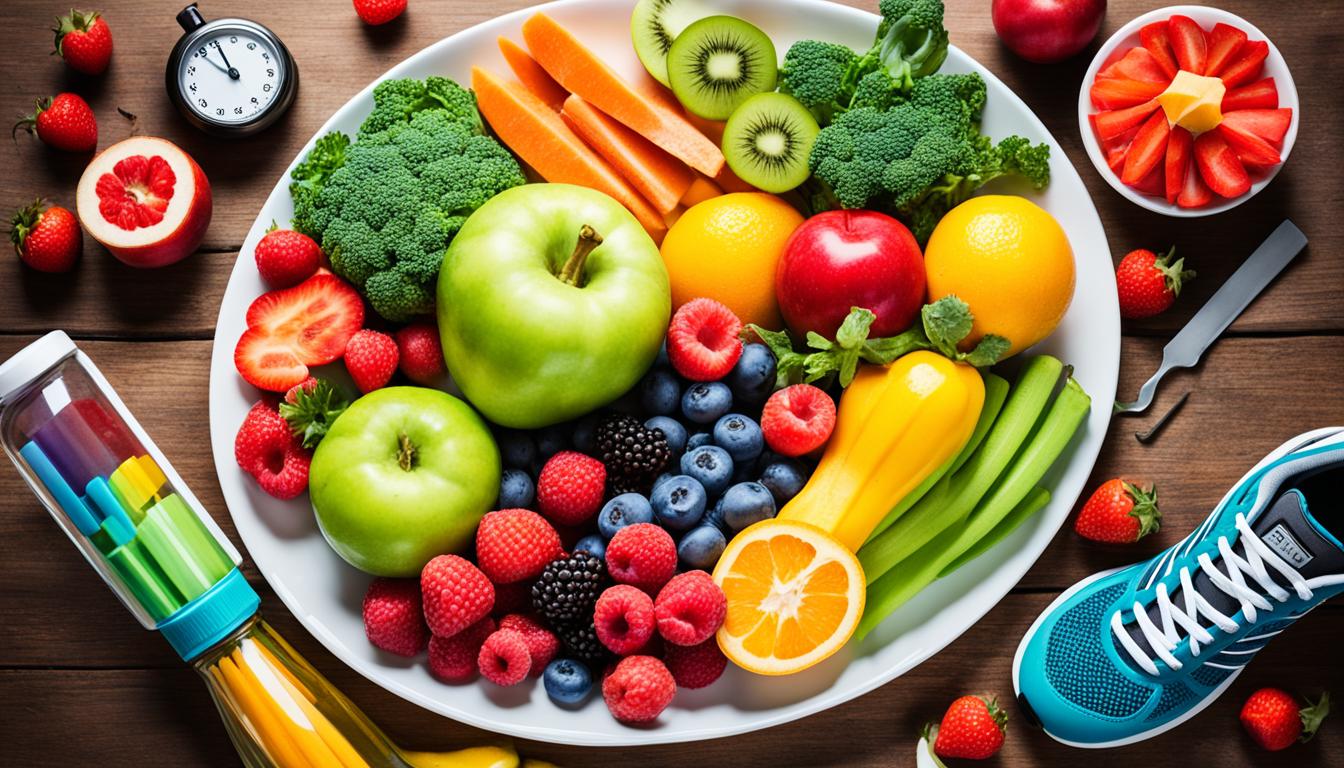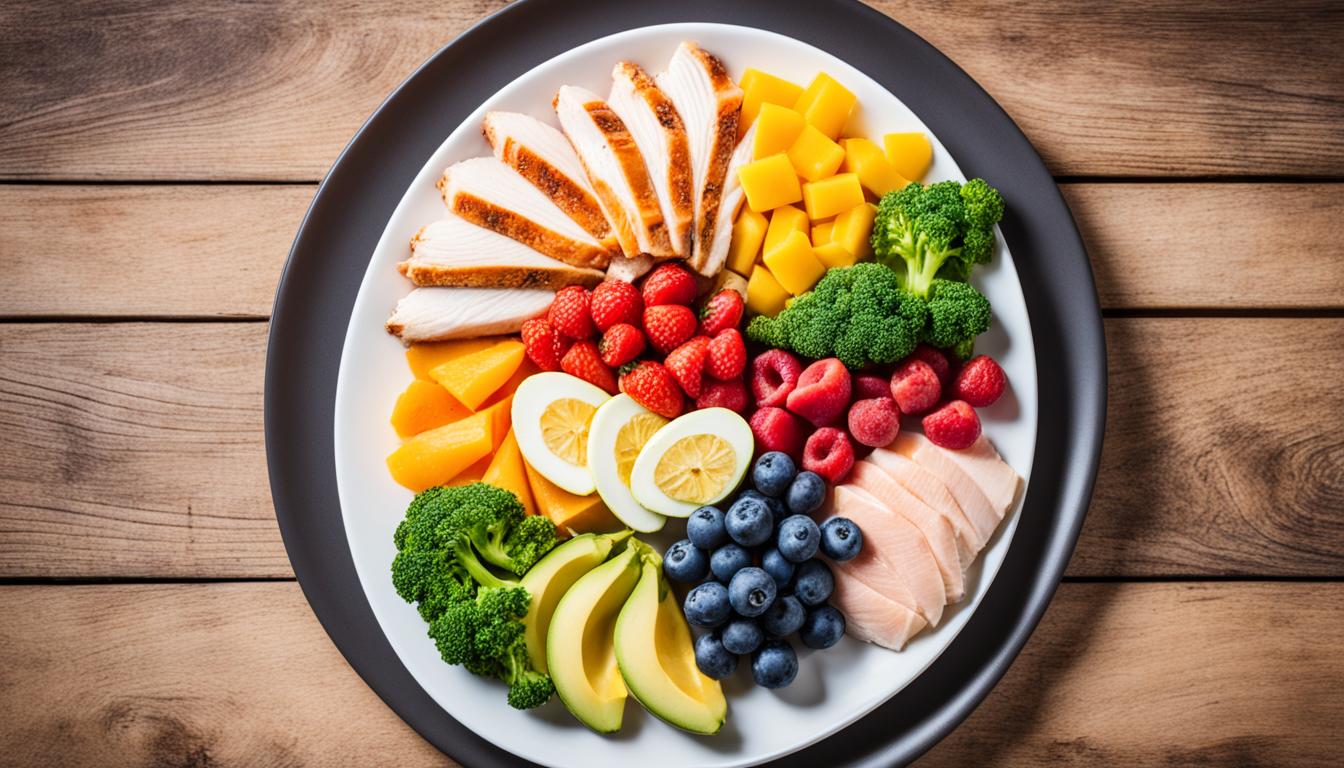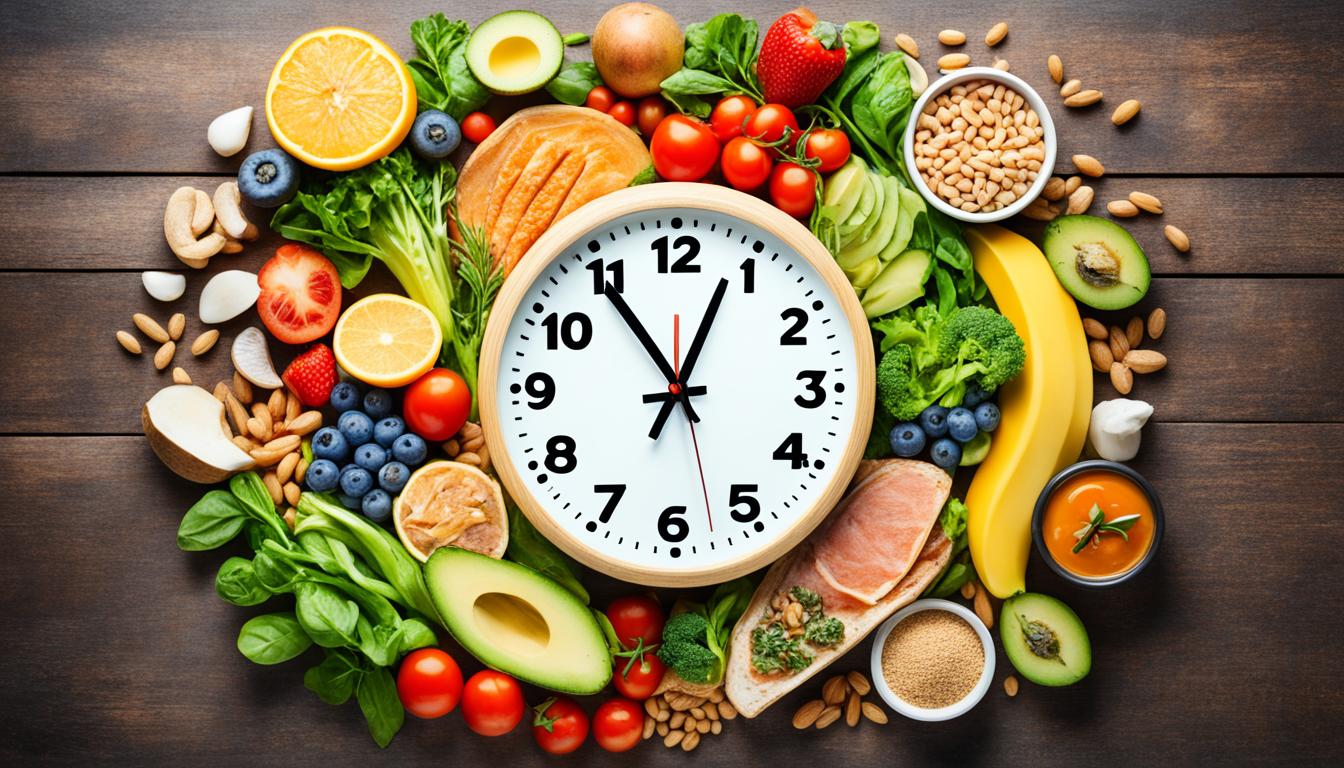Sports nutrition plays a crucial role in optimizing athletic performance and supporting recovery. By fueling your body with the right nutrients, you can enhance your energy levels, build strength, and improve overall athletic performance. In this article, we will provide expert sports nutrition tips to help you optimize your performance and achieve your athletic goals.
Key Takeaways:
- Athletes can enhance their performance and recovery by following sports nutrition guidelines.
- Consulting with a sports dietitian or nutritionist can help create a personalized nutrition plan.
- Macronutrients like carbohydrates, protein, and fats are essential for optimal performance.
- Proper hydration is crucial for athletic performance. Drink water regularly and consider sports drinks during intense activity.
- Fuel your body with a balanced meal or snack before and after workouts for optimal performance and recovery.
The Importance of Healthy Eating for Athletes
Healthy eating is the foundation of sports nutrition. As an athlete, your body requires a well-balanced diet that provides the right balance of macronutrients and micronutrients. This ensures that you have the energy and nutrients needed to support your athletic performance and promote overall health and recovery.
Consulting with a sports dietitian or sports nutritionist can be highly beneficial in creating a personalized nutrition plan tailored to your specific needs. These experts can provide valuable guidance and help you optimize your diet to maximize your athletic potential.
A healthy diet that incorporates a variety of nutrient-rich foods is essential for athletes. It not only fuels your body but also supports muscle repair, enhances endurance, and reduces the risk of injury. By nourishing your body with the right foods, you can achieve peak performance and reach your athletic goals.

“A proper diet is as important as training for athletes. It is the fuel that propels them toward success.” – John McCarthy, Sports Nutritionist
Macronutrients for Optimal Performance
When it comes to optimizing your athletic performance, macronutrients are key. These essential nutrients, including carbohydrates, protein, and fats, provide the fuel and building blocks your body needs to excel in physical activity.
Carbohydrates are the primary source of energy for athletes. They are quickly converted into glucose, providing a readily available fuel source for your muscles during exercise. Including sources of healthy carbohydrates such as whole grains, fruits, and vegetables in your diet is crucial for sustained energy levels and optimal performance.
Protein plays a vital role in muscle repair and growth. It helps rebuild damaged muscle tissue, supports recovery after intense workouts, and contributes to overall strength and endurance. Athletes should prioritize consuming lean sources of protein such as poultry, fish, beans, and legumes to meet their protein needs.
Fats are often misunderstood but are equally important for athletic performance. They serve as an energy reserve, provide insulation, and aid in hormone production. Including healthy fats from nuts, seeds, and oils in your diet is essential for maintaining overall health and supporting optimal performance.
To ensure you’re getting the right balance of macronutrients, consult a sports nutritionist or dietitian who can help create a personalized nutrition plan tailored to your specific needs. They can guide you on the ideal ratio of carbohydrates, protein, and fats based on your training goals and performance requirements.

Great athletes understand the importance of fueling their bodies with the right macronutrients. Carbohydrates provide the energy, protein supports muscle repair and growth, and fats play a crucial role in hormone production. Incorporating a balanced diet rich in these macronutrients will fuel your performance and help you reach new heights.
Hydration for Performance and Recovery
Proper hydration is essential for athletes to perform at their best and support recovery. When it comes to fueling your body, water is the key. Staying hydrated throughout the day is crucial, aiming for at least 8 cups (64 ounces) of water daily. Hydration is not just important during exercise but should be a continuous practice to maintain optimal performance.

During intense physical activity, especially in hot and humid conditions, athletes may need to go beyond water to replenish the electrolytes lost through sweat. This is where sports drinks come into play. Sports drinks provide the necessary electrolytes, like sodium and potassium, that help maintain hydration levels and support proper muscle function.
“Maintaining proper hydration levels is crucial for athletes to perform at their best. Through sweat, the body loses water as well as essential electrolytes. Sports drinks provide a convenient way to replenish these electrolytes and maintain optimal hydration during intense exercise.” – Dr. Sarah Johnson, Sports Nutritionist
However, it’s important to be mindful of the type of sports drinks consumed. Many commercially available sports drinks contain high levels of added sugars, which can be detrimental to your performance and overall health. It’s best to choose low-sugar or no-added-sugar options to avoid any potential negative impacts.
Water remains the best choice for hydration, and athletes should prioritize its consumption throughout the day. Sports drinks should be used when necessary during prolonged or intense activities, but water should still be the main source of hydration.
Remember, staying properly hydrated is essential for optimal performance and recovery. By drinking enough water and using sports drinks wisely, you can ensure your body is fueled and ready to take on any athletic challenge.
Pre-Workout and Post-Workout Nutrition
Fueling your body before and after workouts is crucial for optimal performance and recovery. When it comes to preparing for a workout, consuming a balanced meal or snack that includes a combination of carbohydrates and protein can provide the energy and nutrients necessary to power through your training session.
Carbohydrates serve as the primary fuel source during physical activity, supplying your muscles with the energy needed to perform at their best. Including sources like whole grains, fruits, and vegetables in your pre-workout meal or snack can help ensure you have enough energy to sustain intense exercise.
In addition to carbs, protein plays a critical role in pre-workout nutrition. It aids in muscle repair and growth, allowing your body to recover and adapt to the demands of your workouts. Good sources of protein include lean meats, poultry, fish, beans, and dairy products.
If you’re looking for an extra boost of energy and focus before your workout, you might consider incorporating popular pre-workout supplements into your routine. These supplements are designed to enhance performance, increase energy levels, and improve mental focus during exercise. However, it’s important to choose products from reputable brands and consult with a healthcare professional or registered dietitian before incorporating them into your regimen.
After your workout, prioritizing post-workout recovery is just as important. Consuming a combination of protein and carbohydrates within the first hour following exercise can help replenish energy stores and facilitate muscle repair.
Protein is particularly crucial during this post-workout period, as it provides the amino acids necessary for muscle protein synthesis. This process helps repair damaged muscle tissues and promotes muscle growth over time. Pairing protein with carbohydrates helps maximize glycogen replenishment, the storage form of glucose, which fuels your muscles.
Some excellent post-workout food choices include a protein shake with added fruits, a turkey sandwich on whole grain bread, or yogurt topped with berries and granola. Additionally, there are post-workout recovery supplements available in the market that provide a convenient and concentrated source of protein and carbohydrates to support recovery.
Remember, everyone’s nutritional needs and preferences are different. It’s crucial to listen to your body and experiment with different pre-workout and post-workout nutrition strategies to find what works best for you. As with any dietary changes or supplementation, consulting with a registered dietitian or nutritionist is always a good idea to ensure you’re meeting your specific nutritional goals.
The Role of Vitamins and Minerals
Vitamins and minerals are essential for maintaining overall health and supporting athletic performance. As an athlete, it’s important to ensure that you are getting adequate amounts of these nutrients to optimize your performance. Specifically, calcium, vitamin D, and iron play crucial roles in your athletic journey.
Calcium is necessary for bone health and muscle function. It helps build and maintain strong bones, which are essential for athletes who put their bodies through rigorous training and physical activity. Good food sources of calcium include dairy products like milk, cheese, and yogurt.
Vitamin D is essential for calcium absorption and bone health. It helps your body utilize calcium effectively. The sun is a natural source of vitamin D, but you can also find it in foods like fatty fish (such as salmon and tuna), fortified dairy products, and egg yolks.
Iron is crucial for delivering oxygen to your muscles and tissues. It plays a key role in energy production and endurance, which are essential for athletic performance. Good food sources of iron include lean meats like beef and poultry, seafood, beans, and leafy green vegetables.

While a well-balanced diet should provide you with the necessary vitamins and minerals, some athletes may consider taking supplements to ensure they meet their nutritional needs. However, it’s important to consult with a healthcare professional or sports nutritionist before starting any supplement regimen.
Meal Timing and Planning
The timing of meals is crucial for athletes to optimize performance and fuel their bodies effectively.
Eating a well-balanced meal or snack before exercise provides the necessary energy for physical activity. It ensures that your body has enough fuel to power through your workouts and perform at its best. Include a combination of carbohydrates, protein, and healthy fats in your pre-workout meal or snack to provide sustained energy and support muscle function.
For example, you can have a whole grain toast with avocado and scrambled eggs, or a fruit smoothie with Greek yogurt and nuts. Remember to hydrate adequately before exercising to maintain optimal performance.
Refueling with nutritious foods within 15-30 minutes after a workout is equally important for recovery. This post-workout meal or snack should focus on replenishing energy stores and providing the necessary nutrients for muscle repair and growth.
Include a mix of carbohydrates and protein in your post-workout meal to promote glycogen replenishment and support muscle recovery. Some examples include a chicken stir-fry with brown rice, a turkey sandwich on whole wheat bread, or a protein shake with fruit.
Meal planning, tailored to your specific needs, can be a helpful strategy to stay on track with your nutrition and maximize your performance. Plan your meals and snacks ahead of time, ensuring that they align with your sports nutrition plan.
This helps you maintain a well-rounded diet and ensures that you have the right balance of nutrients to support your goals. Consider working with a sports dietitian or nutritionist to create a personalized meal plan based on your specific needs and preferences.
Plan for Success
When planning your meals, focus on incorporating a variety of nutrient-dense foods to meet your macronutrient and micronutrient needs. Include a wide range of colorful fruits, vegetables, whole grains, lean proteins, and healthy fats in your diet.
Preparation is key, so take the time to batch cook and meal prep ahead of time. This can save you time and make it easier to stick to your nutrition plan, especially during busy periods. Consider using containers or sectioned plates to portion out your meals and ensure you are getting the right amounts of each food group.
Remember to listen to your body and adjust your meal timing and portions as needed. Every athlete is different, and it’s essential to find a meal timing and planning strategy that works best for you.

Meal timing and planning are essential components of a successful sports nutrition plan. By fueling your body at the right times and with the right nutrients, you can optimize performance, support recovery, and reach your athletic goals.
Conclusion
Optimizing athletic performance through sports nutrition requires a well-rounded approach that includes healthy eating, proper hydration, macronutrient balance, and smart supplementation. By following these sports nutrition tips, athletes can fuel their bodies for optimal performance, enhance their recovery, and achieve their athletic goals.
Remember to consult with a sports dietitian or nutritionist for personalized guidance and develop a nutrition plan that works best for you. These professionals can provide expert advice tailored to your specific needs and goals.
Elevate your game with the power of sports nutrition and take your athletic performance to new heights. Whether you’re a professional athlete or a fitness enthusiast, the right nutrition can make a significant difference in your performance and overall well-being. Invest in your body and fuel it with the nutrients it needs to succeed.
FAQ
Why is sports nutrition important for athletes?
Sports nutrition plays a crucial role in optimizing athletic performance and supporting recovery. By fueling your body with the right nutrients, you can enhance your energy levels, build strength, and improve overall athletic performance.
How can healthy eating benefit athletes?
Healthy eating is the foundation of sports nutrition. Athletes need to consume a well-balanced diet that provides the right balance of macronutrients and micronutrients. A healthy diet not only provides the necessary fuel for athletic performance but also promotes overall health and recovery.
What are the macronutrients athletes should focus on?
Athletes should focus on consuming carbohydrates for energy, lean sources of protein for muscle repair, and healthy fats for hormone production and energy storage.
How important is hydration for athletes?
Proper hydration is essential for athletes to perform at their best and support recovery. Athletes should drink water regularly throughout the day and consider sports drinks during intense physical activity.
What should athletes consume before and after workouts?
Before a workout, athletes should consume a balanced meal or snack that includes carbohydrates for energy and protein for muscle repair. After a workout, a combination of protein and carbohydrates is important for replenishing energy stores and supporting muscle repair.
Do athletes need to take supplements?
Athletes may consider taking supplements if they are unable to meet their nutritional needs through food alone. It’s important to consult with a sports dietitian or nutritionist to determine if supplements are necessary.
How does meal timing impact athletic performance?
The timing of meals is crucial for athletes to optimize performance and fuel their bodies effectively. Eating a well-balanced meal or snack before exercise provides the necessary energy, and refueling with nutritious foods within 15-30 minutes after a workout supports recovery.
What is the key to optimizing athletic performance with sports nutrition?
Optimizing athletic performance through sports nutrition requires a well-rounded approach that includes healthy eating, proper hydration, macronutrient balance, and smart supplementation. Consulting with a sports dietitian or nutritionist can help develop a personalized plan.
Source Links
- https://www.ncbi.nlm.nih.gov/pmc/articles/PMC3805623/
- https://www.upmc.com/services/sports-medicine/services/sports-nutrition/nutrition-tips
- https://www.betterhealth.vic.gov.au/health/healthyliving/sporting-performance-and-food


